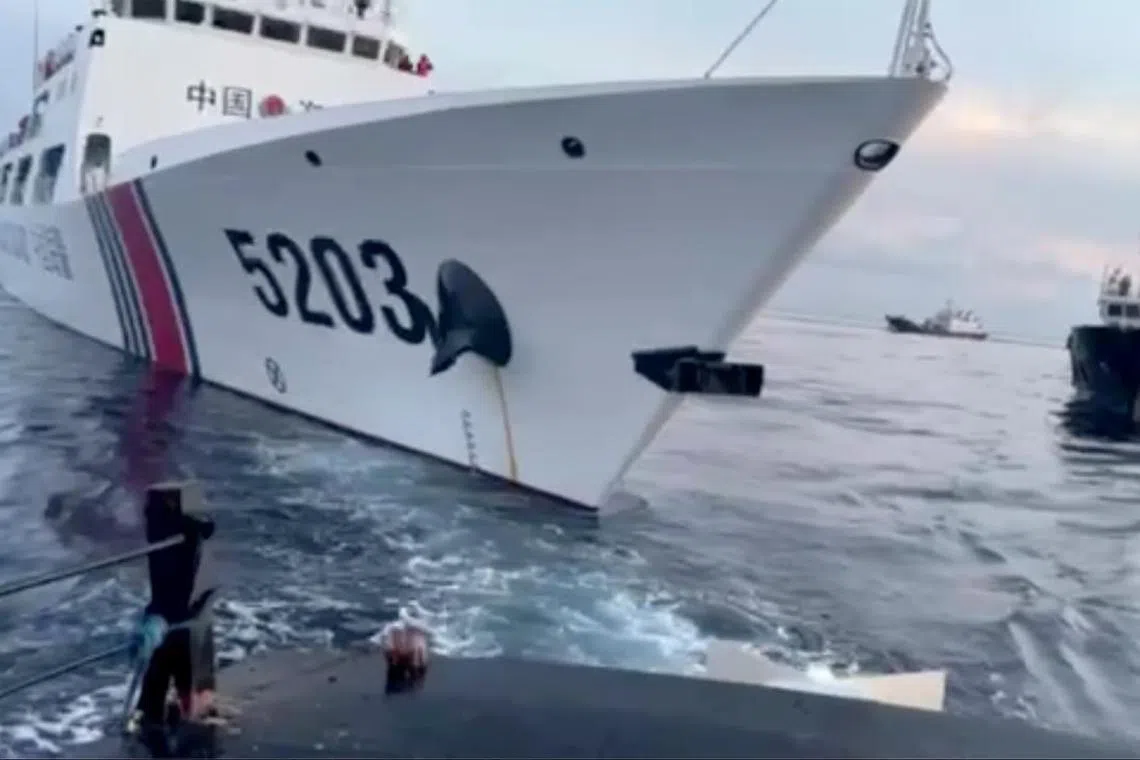Philippines summons Chinese envoy, declares its ‘firm resolve’ after collision in South China Sea
Sign up now: Get insights on Asia's fast-moving developments

A Chinese coast guard ship (left) after a collision with a Philippine supply boat as they approached Second Thomas Shoal in the South China Sea on Sunday.
PHOTO: EPA-EFE
Follow topic:
MANILA – The Philippines summoned the Chinese ambassador on Monday over a collision between Chinese vessels and Philippine ships in the South China Sea, and said that it will not be deterred in defending its sovereignty claim in the disputed waterway.
“Let our people know, and the rest of the world, that this incident will not deter us from doing what is right, what is for the benefit of our people, and what will support and strengthen the rules-based international order. No unlawful force will soften our firm resolve,” said Colonel Medel Aguilar, a spokesman for the Armed Forces of the Philippines, at a press briefing on Monday.
Beijing and Manila traded accusations on Sunday after their ships collided while the Philippines was sending supplies to troops stationed on a decrepit World War II-era vessel that was intentionally grounded in 1999 at Second Thomas Shoal, part of the Spratly Islands in the South China Sea.
This is just the latest in a series of tense encounters between the two countries in waters near the shoal, known by Filipinos as Ayungin and called Ren’ai Jiao by Beijing.
The Philippines’ Department of Foreign Affairs on Monday summoned Chinese Ambassador to Manila Huang Xilian and filed a diplomatic protest against Beijing over the incident.
Mr Huang was out of town, so it was Deputy Chief of Mission Zhou Zhiyong who met Foreign Affairs Assistant Secretary Aileen Mendiola-Rau instead.
Meanwhile, the Chinese Embassy said Mr Zhou told the Philippines “to take seriously China’s grave concerns, honour its promise, stop making provocations at sea, stop making dangerous moves, stop groundlessly attacking and slandering China, and to tow away the illegally ‘grounded’ warship as soon as possible”.
Beijing claims sovereignty over almost the entire South China Sea, including parts of the exclusive economic zones of the Philippines, Vietnam, Malaysia, Brunei and Indonesia. The Permanent Court of Arbitration in 2016 said China’s claims had no legal basis.
Beijing has refused to recognise this ruling and has instead ramped up its military presence and artificial island-building activities in the disputed sea.
Mr Jonathan Malaya, a spokesman for the National Task Force for the West Philippine Sea, said the Philippines will continue supplying its troops stationed at Second Thomas Shoal,
“We will supply our troops in Ayungin Shoal no matter the overwhelming odds... because this is the Philippines implementing the 2016 arbitral ruling,” he said at the briefing.
The Chinese Embassy insisted it was the Philippine vessels that had trespassed on its territory and accused them of deliberately causing the collisions
Maritime security expert Collin Koh from the S. Rajaratnam School of International Studies said China is trying to play the alternative narrative game, after it quickly published a statement and released videos to counter the Philippines’ accusations on Sunday.
“It’s concerned that the existing narrative is against its favour in the international community and hence, it’s trying to push the agenda of portraying the Philippines as an aggressor egged on by Washington. We are so far still seeing what can be termed horizontal escalation – intensifying existing measures with ramped-up tactical moves such as in this case, actively trying to block the resupply mission,” said Dr Koh.
Countries such as the United States, Canada, Germany, Japan and Australia have condemned China’s latest actions against the Philippines. Washington, in particular, reminded Beijing that its Mutual Defence Treaty with Manila can be invoked in case of an armed attack in the South China Sea.
The Philippines reported at least two incidents earlier in October when Chinese vessels shadowed its ships that were part of routine supply missions to its Second Thomas Shoal outpost.
Defence analyst Don McLain Gill, a lecturer at De La Salle University in Manila, described China’s actions against the Philippines in October alone as a “quick escalation”.
The Philippine government has adopted a strategy of swiftly publicising these encounters.
“Manila must continue to publicise broadcasts of Chinese assertions to ensure that Beijing’s efforts to simultaneously alter the status quo narrative through disinformation campaigns will be pushed back,” Mr Gill said.


